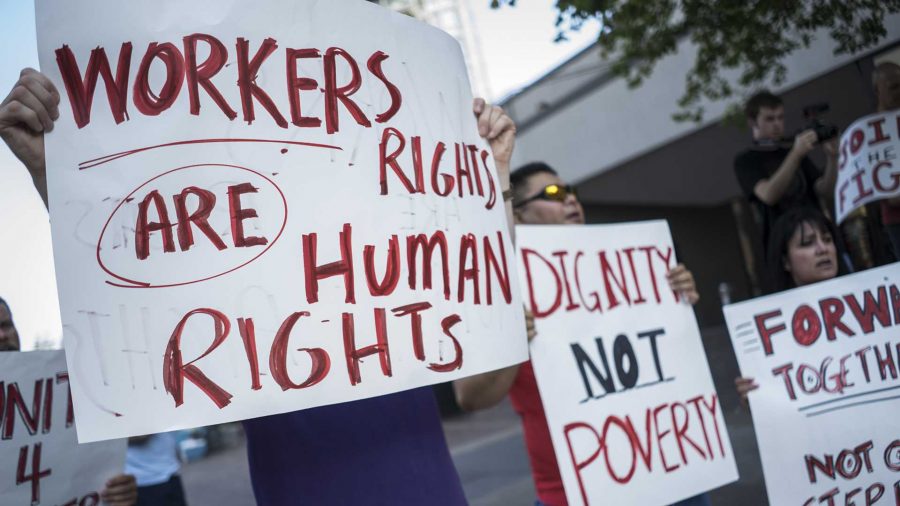By Lucee Laursen
[email protected]
The Iowa City community united again to protest the current minimum wage of $7.25 an hour. The crowd could be heard chanting “hey hey, ho ho, low wages have got to go.” In 2015, Johnson County passed an ordinance raising the minimum wage to $10.10. Not long after, Gov. Terry Branstad signed a law that made the county ordinance null, minimum wage returned to $7.25. Now, changing state legislation is the only way to ensure Iowa City community workers and the workers at the university will receive a higher wage.
When the county ordinance went into effect in January, the university was able to get out of raising its minimum wage because it is a state entity. This meant that the thousands of student employees who worked at the university did not receive a raise. This left those envious of their friends who now made significantly more than them. The UI’s lowest paying job is $8.20 an hour, which is better than the federal and state minimum wage. But this is still not enough.
Students who work for the university are restricted to working only 20 hours a week. That means that students who make $8.20 would gross $656 before taxes. To put this in perspective, average rent for a one-bedroom apartment is $669.58. So what the student employee makes in a month does not even cover rent. That does not take into consideration food, tuition, utilities, and many more expenses that students face on a monthly basis.
RELATED: Groups rally on Ped Mall for $10.10 minimum wage
The original ordinance was passed in part because Johnson County has one of the highest costs of living in the state. It seemed fitting that we would have a higher minimum wage. The initiative behind Johnson County’s previous wage increase was quite pure. However, it could only positively affect some Iowa City workers — not ones who work at the university. Raising the minimum wage needs to be a state initiative because the cost of living for all the people who live in this area is the same; therefore, we should all have the same minimum wage.
Some would argue that raising the minimum wage for students and employees at the university would have adverse effects. Realistically thinking, extra money required to pay employees who do not currently make $10.10 or more would be subsidized by student tuition. However, there is no way to predict or say where the extra money would come from. It could come from donors or block grants.
Iowa must come together to raise the state minimum wage. The current $7.25 just doesn’t cut it. Students deserve better, residents deserve better, we deserve better. Going through the state to make this change is the only way that this will ever happen for Iowa City and for the rest of the state. If you, too, want to get involved, you can write to your representatives and urge them to support a statewide minimum-wage increase.



